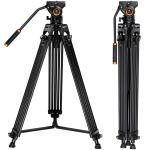Reviews
Robust tripod with many adjustment options
When I was looking for a video tripod for my bridge camera, I decided on this tripod. Since there were no pre-reviews, I had to buy the "pig in a poke". But since other Cayer tripods have been rated well, I decided to buy them. The decisive factor for me was that the tripod should be robust and extendable. The tripod has now been delivered and corresponds to the item description.
My description refers to the first impression after trying it out, I can't yet provide any long-term experiences.
The Cayer AF2451 is made of sturdy metal with only a few plastic parts and, as you would expect, it is not a very light tripod. The carrying case that comes with it also makes a robust impression. I hadn't really understood how the fixation of the legs works from the texts. The system also makes a very stable impression. A small silver-colored metal plate can practically be pulled out so that each leg can move freely. If you push this part in, it can press itself into one of the three specified "steps" so that one of the three possible angular positions is fixed. Simple but robust and effective. (On other tripods, the "detents" have sometimes stuck, which is not the case here.)
The tripod is very stable even when fully extended. With the tripod you can reach a height of approx. 1.90 m of the optical axis of a camera mounted on it. The clip locks for the tripod legs are easy to use. There are two small circular spirit levels for adjustment, one on the "spider" of the tripod and one on the video head. This can be fine-tuned using a screw on the side. You can't adjust the resistance for turning the head and tilting it, but you can adjust the pressure of the locking screws, so that you can adjust the "ease of movement" a bit.
As shown in the picture, the base plate is secured against accidental slipping out with a button. I also have no complaints about the clamping device for the holding plate. The rubber feet can be exchanged for spikes, which are included in the scope of delivery. Various Allen keys are also included for tightening the screws. The stand rod has a hook at the bottom to which a weight can be attached. This bracket can be unscrewed so that the rod can also be attached upside down in order to achieve small distances to the ground.
As shown in the pictures, the leg with the casing can be unscrewed so that you can also make a monopod together with the middle tripod rod.
Overall, everything makes a stable and solid impression. I'm curious to see how the tripod will prove itself in use.
My description refers to the first impression after trying it out, I can't yet provide any long-term experiences.
The Cayer AF2451 is made of sturdy metal with only a few plastic parts and, as you would expect, it is not a very light tripod. The carrying case that comes with it also makes a robust impression. I hadn't really understood how the fixation of the legs works from the texts. The system also makes a very stable impression. A small silver-colored metal plate can practically be pulled out so that each leg can move freely. If you push this part in, it can press itself into one of the three specified "steps" so that one of the three possible angular positions is fixed. Simple but robust and effective. (On other tripods, the "detents" have sometimes stuck, which is not the case here.)
The tripod is very stable even when fully extended. With the tripod you can reach a height of approx. 1.90 m of the optical axis of a camera mounted on it. The clip locks for the tripod legs are easy to use. There are two small circular spirit levels for adjustment, one on the "spider" of the tripod and one on the video head. This can be fine-tuned using a screw on the side. You can't adjust the resistance for turning the head and tilting it, but you can adjust the pressure of the locking screws, so that you can adjust the "ease of movement" a bit.
As shown in the picture, the base plate is secured against accidental slipping out with a button. I also have no complaints about the clamping device for the holding plate. The rubber feet can be exchanged for spikes, which are included in the scope of delivery. Various Allen keys are also included for tightening the screws. The stand rod has a hook at the bottom to which a weight can be attached. This bracket can be unscrewed so that the rod can also be attached upside down in order to achieve small distances to the ground.
As shown in the pictures, the leg with the casing can be unscrewed so that you can also make a monopod together with the middle tripod rod.
Overall, everything makes a stable and solid impression. I'm curious to see how the tripod will prove itself in use.
06/11/2023

